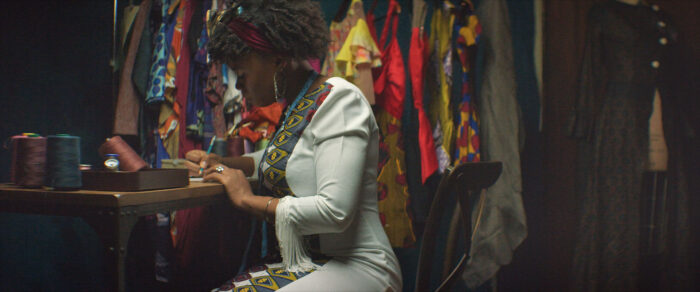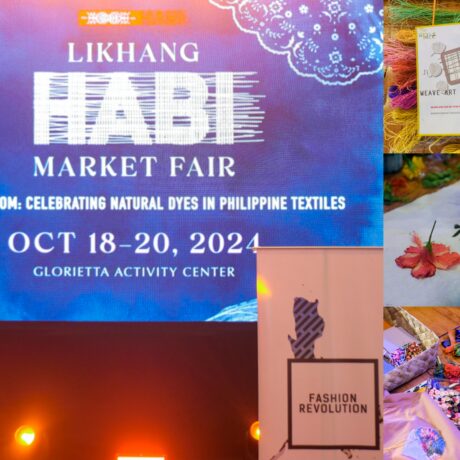Empowering Women through Making
Around the world, the fashion industry is too often a driver of exploitation and inequality. Research from CARE International suggests that nearly one in three female garment workers has faced sexual harassment in the workplace. Yet we also know that consumers want fashion brands that they love to empower and uplift the women in their supply chains. In our 2018 consumer survey, 72% of people said that fashion brands should do more to improve the lives of women making their clothes, shoes and accessories.
When we created our Manifesto for a Fashion Revolution, we assembled our dream for a fashion industry that values people and enriches lives. Point 2 of the manifest reads, “Fashion provides fair and equal pay. It enriches the livelihood of everyone working across the industry, from farm to shop floor. Fashion lifts people out of poverty, creates thriving societies and fulfils aspiration.”
Below, we speak to the founders of 3 organisations that are living out our manifesto through their work and championing fashion as a force for good. Secret Projects, Custom Collaborative, and Sambhali Trust are 3 very unique organisations that empower women and improve their chances of meaningful work by teaching valuable making and business skills. With oceans between them, each deal with unique challenges, but are alike in their mission to empower women, confront gender inequality, and create products that change the lives of their makers.
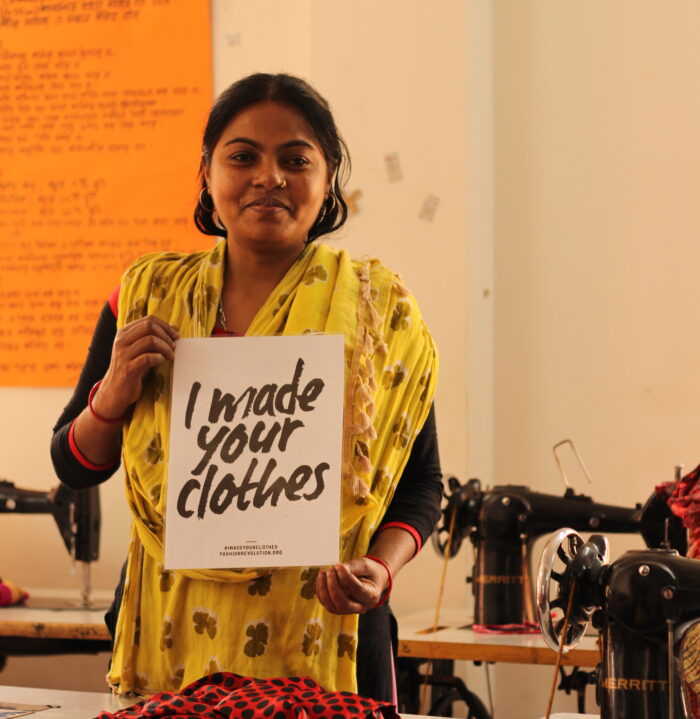
“Secret Projects began by accident,” says founder Fritha Vincent. “I was with a self help group in India and I discovered that they were trained to stitch but could not make an income from making and selling clothes and homewares”. Understanding that the craftsmanship was already there, Fritha wanted to close the gap in sales and marketing, and enable makers to run their own enterprises.
Today, the organisation runs a 4-stage empowerment programme designed to train Makers, through what they call their Maker-networks, and teaches them to make a product with an already existing consumer demand.
With Maker-networks across India, Secret Projects collaborates with already existing NGOs. They also share the stories of their makers on their website so that consumers can meet the people who make their products. Fritha says, “Conscious consumers want to know EVERYTHING about the things they buy to ensure their values align with their purchases. This is a great opportunity for businesses like ours who are focused on empowerment because connecting the Makers and the customers is incredibly empowering for both groups of people”.
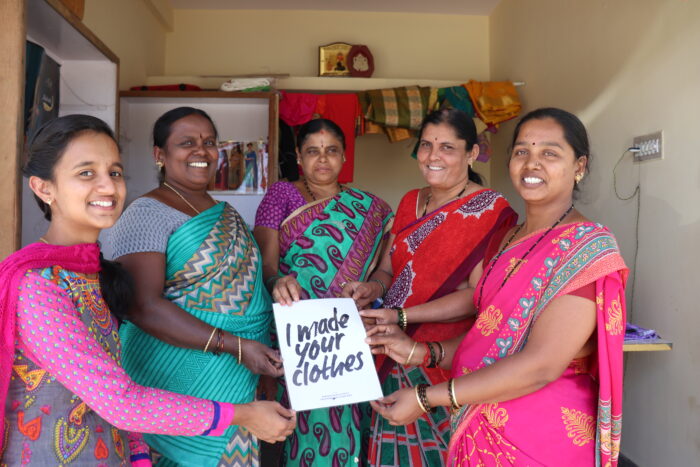
In Rajasthan, Northern India, another cooperative exists to help women launch their own businesses. Sambhali Trust runs a free 12-month training course for women to learn sewing and making skills, at the end of which, women are given their own sewing machine. Many of the women that use these recources face violence and discrimination, so the Sambhali serves to lift them out of poverty. The charity’s founder, Govind Rathore, says, “Not only can they make clothes for themselves and their family, but also for all local women in their community. Sambhali provides the women with the technical, business and social skills to be able to establish themselves with a small business of their own. This is the same in both urban and rural areas. Some students also become sewing tutors in Sambhali itself, which gives them more confidence to be able to teach and steady employment. They are then able to find other employment with teaching skills.”
Sambhali also sells clothing made by the women in their online boutique, which brings income back into the foundation, and supports the women.
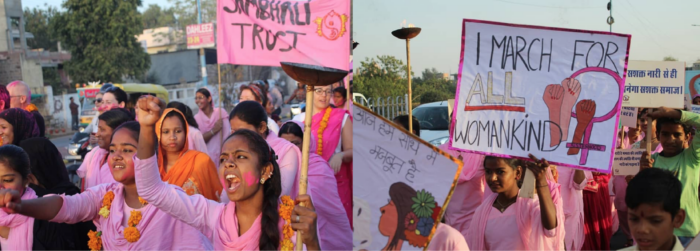
Asked about gender inequality in the garment industry, Govind tell us, “Women need to get together as a “workers’ trade union” in each manufacturing company (rather than a national Workers Union) and elect some good spokespeople who are able to approach the managers of that company to be able to negotiate their pay and discuss the employment of women”. He stresses the importance of local NGOs and governments to regulate the garment and textile industries and advocate for women.
Sambhali Trust took part in our #IMadeYourClothes campaign by sharing the stories of some of their student and maker members. Govind says, “By joining in this campaign, we want people to know that there are real women with real stories behind each and every garment. And by purchasing those garments, customers are helping to improve the lives of those women. This campaign helps to recognise the individual craftsmanship, that our women are not exploited by large manufacturers and that creativity is encouraged. By joining this campaign we help to join part of the change in the textile industries to improve women’s rights.”
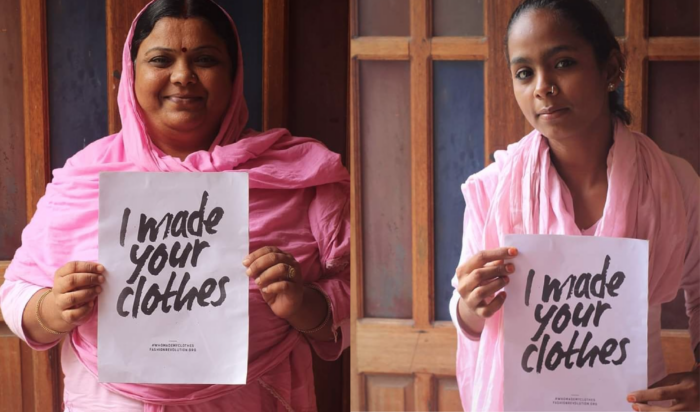
On the other side of the world, in New York City, Custom Collaborative is empowering makers in a rapidly changing American garment industry. In 2015, Ngozi Okaro needed a custom-made outfit, and the rest was history. “I came across a woman from Guinea who fulfilled my need, and then every person I met said that they wanted the same thing — clothes that fit and made them look good. I connected my dressmaker to other clients, but I knew that there must be a better way to develop a system that paid the dressmaker fairly, allowed customers to find and access talented artisans, and wove environmental stewardship into both sides consciousness.”
In particular, the organisation works with low-income and immigrant women who face barriers to gainful employment. Many of the beneficiaries of Custom Collaborative are struggling with homelessness, discrimination, domestic violence, poverty, language, criminal-system involvement, care of young children, care of elders, inadequate health care. “To name a few”, adds Ngozi. Yet, Custom Collaborative is able to support these women through training in essential clothes manufacturing skills and artisan techniques.
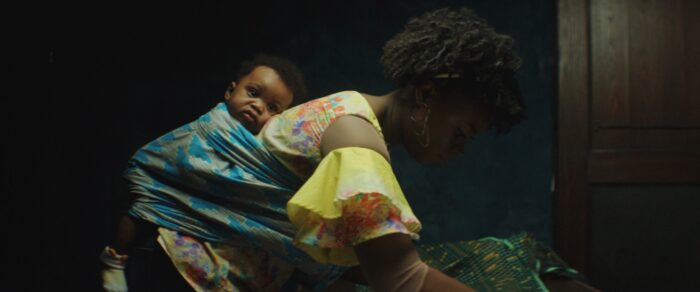
As a long-time activist, lawyer, and community organiser, these challenges are nothing new to Ngozi. She tells us, “Many years ago I owned shares in a fast-food company that bought tomatoes that were harvested by workers who were treated unfairly. As a shareholder I voted for resolutions and directors that would force change in the company. I also donated money to the movement to help organisers. I believe that we each have a part to play. I think that we should support the companies that treat all people fairly, shun those companies that don’t, and spread the message of what we are doing and why.” It’s refreshing to hear someone who has been on both sides of the equation, once a shareholder for a big company, and now the founder and director of an impactful grassroots organisation.
Asked why people should know who made their clothes, Ngozi says, “So they can reflect on the human connection”. When you buy from Custom Collaborative, each piece has the name of the maker on the label. “Would you throw away after one wear the Afrikamono that Kulwant made if you knew how much time she put into making and designing it? I think not, because knowing her name humanizes her and reminds you that a loving, caring person, not a machine, helped you express your style.”
